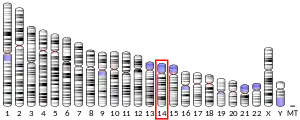Atlastin
Atlastin, or Atlastin-1, is a protein that in humans is encoded by the ATL1 gene.[4][5][6]
References
- GRCh38: Ensembl release 89: ENSG00000198513 - Ensembl, May 2017
- "Human PubMed Reference:". National Center for Biotechnology Information, U.S. National Library of Medicine.
- "Mouse PubMed Reference:". National Center for Biotechnology Information, U.S. National Library of Medicine.
- Hazan J, Lamy C, Melki J, Munnich A, de Recondo J, Weissenbach J (Jan 1994). "Autosomal dominant familial spastic paraplegia is genetically heterogeneous and one locus maps to chromosome 14q". Nat Genet. 5 (2): 163–7. doi:10.1038/ng1093-163. PMID 8252041.
- Gispert S, Santos N, Damen R, Voit T, Schulz J, Klockgether T, Orozco G, Kreuz F, Weissenbach J, Auburger G (Feb 1995). "Autosomal dominant familial spastic paraplegia: reduction of the FSP1 candidate region on chromosome 14q to 7 cM and locus heterogeneity". Am J Hum Genet. 56 (1): 183–7. PMC 1801298. PMID 7825576.
- "Entrez Gene: SPG3A spastic paraplegia 3A (autosomal dominant)".
External links
- GeneReviews/NCBI/NIH/UW entry on Spastic Paraplegia 3A
- Human ATL1 genome location and ATL1 gene details page in the UCSC Genome Browser.
- Human GBP3 genome location and GBP3 gene details page in the UCSC Genome Browser.
Further reading
- Maruyama K, Sugano S (1994). "Oligo-capping: a simple method to replace the cap structure of eukaryotic mRNAs with oligoribonucleotides". Gene. 138 (1–2): 171–4. doi:10.1016/0378-1119(94)90802-8. PMID 8125298.
- Andersson B, Wentland MA, Ricafrente JY, et al. (1996). "A "double adaptor" method for improved shotgun library construction". Anal. Biochem. 236 (1): 107–13. doi:10.1006/abio.1996.0138. PMID 8619474.
- Yu W, Andersson B, Worley KC, et al. (1997). "Large-scale concatenation cDNA sequencing". Genome Res. 7 (4): 353–8. doi:10.1101/gr.7.4.353. PMC 139146. PMID 9110174.
- Suzuki Y, Yoshitomo-Nakagawa K, Maruyama K, et al. (1997). "Construction and characterization of a full length-enriched and a 5'-end-enriched cDNA library". Gene. 200 (1–2): 149–56. doi:10.1016/S0378-1119(97)00411-3. PMID 9373149.
- Zhao X, Alvarado D, Rainier S, et al. (2001). "Mutations in a newly identified GTPase gene cause autosomal dominant hereditary spastic paraplegia". Nat. Genet. 29 (3): 326–31. doi:10.1038/ng758. PMID 11685207.
- Muglia M, Magariello A, Nicoletti G, et al. (2002). "Further evidence that SPG3A gene mutations cause autosomal dominant hereditary spastic paraplegia". Ann. Neurol. 51 (6): 794–5. doi:10.1002/ana.10185. PMID 12112092.
- Luan Z, Zhang Y, Liu A, et al. (2002). "A novel GTP-binding protein hGBP3 interacts with NIK/HGK". FEBS Lett. 530 (1–3): 233–8. doi:10.1016/S0014-5793(02)03467-1. PMID 12387898.
- Strausberg RL, Feingold EA, Grouse LH, et al. (2003). "Generation and initial analysis of more than 15,000 full-length human and mouse cDNA sequences". Proc. Natl. Acad. Sci. U.S.A. 99 (26): 16899–903. doi:10.1073/pnas.242603899. PMC 139241. PMID 12477932.
- Tessa A, Casali C, Damiano M, et al. (2003). "SPG3A: An additional family carrying a new atlastin mutation". Neurology. 59 (12): 2002–5. doi:10.1212/01.wnl.0000036902.21438.98. PMID 12499504.
- Heilig R, Eckenberg R, Petit JL, et al. (2003). "The DNA sequence and analysis of human chromosome 14". Nature. 421 (6923): 601–7. doi:10.1038/nature01348. PMID 12508121.
- Dalpozzo F, Rossetto MG, Boaretto F, et al. (2004). "Infancy onset hereditary spastic paraplegia associated with a novel atlastin mutation". Neurology. 61 (4): 580–1. doi:10.1212/01.wnl.0000078189.73611.df. PMID 12939451.
- Zhu PP, Patterson A, Lavoie B, et al. (2004). "Cellular localization, oligomerization, and membrane association of the hereditary spastic paraplegia 3A (SPG3A) protein atlastin". J. Biol. Chem. 278 (49): 49063–71. doi:10.1074/jbc.M306702200. PMID 14506257.
- Wilkinson PA, Hart PE, Patel H, et al. (2004). "SPG3A mutation screening in English families with early onset autosomal dominant hereditary spastic paraplegia". J. Neurol. Sci. 216 (1): 43–5. doi:10.1016/S0022-510X(03)00210-7. PMID 14607301.
- Sauter SM, Engel W, Neumann LM, et al. (2004). "Novel mutations in the Atlastin gene (SPG3A) in families with autosomal dominant hereditary spastic paraplegia and evidence for late onset forms of HSP linked to the SPG3A locus". Hum. Mutat. 23 (1): 98. doi:10.1002/humu.9205. PMID 14695538.
- D'Amico A, Tessa A, Sabino A, et al. (2004). "Incomplete penetrance in an SPG3A-linked family with a new mutation in the atlastin gene". Neurology. 62 (11): 2138–9. doi:10.1212/01.wnl.0000127698.88895.85. PMID 15184642.
- Hedera P, Fenichel GM, Blair M, Haines JL (2004). "Novel mutation in the SPG3A gene in an African American family with an early onset of hereditary spastic paraplegia". Arch. Neurol. 61 (10): 1600–3. doi:10.1001/archneur.61.10.1600. PMID 15477516.
- Gerhard DS, Wagner L, Feingold EA, et al. (2004). "The status, quality, and expansion of the NIH full-length cDNA project: the Mammalian Gene Collection (MGC)". Genome Res. 14 (10B): 2121–7. doi:10.1101/gr.2596504. PMC 528928. PMID 15489334.
- Abel A, Fonknechten N, Hofer A, et al. (2005). "Early onset autosomal dominant spastic paraplegia caused by novel mutations in SPG3A". Neurogenetics. 5 (4): 239–43. doi:10.1007/s10048-004-0191-2. PMID 15517445.
This article is issued from Wikipedia. The text is licensed under Creative Commons - Attribution - Sharealike. Additional terms may apply for the media files.

